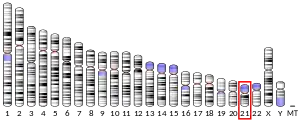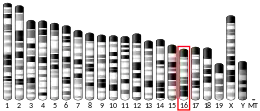| ADAMTS5 | |||||||||||||||||||||||||||||||||||||||||||||||||||
|---|---|---|---|---|---|---|---|---|---|---|---|---|---|---|---|---|---|---|---|---|---|---|---|---|---|---|---|---|---|---|---|---|---|---|---|---|---|---|---|---|---|---|---|---|---|---|---|---|---|---|---|
 | |||||||||||||||||||||||||||||||||||||||||||||||||||
| |||||||||||||||||||||||||||||||||||||||||||||||||||
| Identifiers | |||||||||||||||||||||||||||||||||||||||||||||||||||
| Aliases | ADAMTS5, ADAM-TS 11, ADAM-TS 5, ADAM-TS5, ADAMTS-11, ADAMTS-5, ADAMTS11, ADMP-2, ADAM metallopeptidase with thrombospondin type 1 motif 5 | ||||||||||||||||||||||||||||||||||||||||||||||||||
| External IDs | OMIM: 605007 MGI: 1346321 HomoloGene: 5109 GeneCards: ADAMTS5 | ||||||||||||||||||||||||||||||||||||||||||||||||||
| |||||||||||||||||||||||||||||||||||||||||||||||||||
| |||||||||||||||||||||||||||||||||||||||||||||||||||
| |||||||||||||||||||||||||||||||||||||||||||||||||||
| |||||||||||||||||||||||||||||||||||||||||||||||||||
| |||||||||||||||||||||||||||||||||||||||||||||||||||
| Wikidata | |||||||||||||||||||||||||||||||||||||||||||||||||||
| |||||||||||||||||||||||||||||||||||||||||||||||||||
A disintegrin and metalloproteinase with thrombospondin motifs 5 also known as ADAMTS5 is an enzyme that in humans is encoded by the ADAMTS5 gene.[5][6]
Function
ADAMTS5 is a member of the ADAMTS (a disintegrin and metalloproteinase with thrombospondin motifs) protein family. Members of the family share several distinct protein modules, including a propeptide region, a metalloproteinase domain, a disintegrin-like domain, and a thrombospondin type 1 (TS) motif. Individual members of this family differ in the number of C-terminal TS motifs, and some have unique C-terminal domains. The enzyme encoded by this gene contains two C-terminal TS motifs and functions as aggrecanase to cleave aggrecan, a major proteoglycan of cartilage.[7] ADAMTS5 may also have a role in the pathogenesis of human osteoarthritis.[8]
Animal studies
Genetically modified mice in which the catalytic domain of ADAMTS5 was deleted are resistant to cartilage destruction in an experimental model of osteoarthritis.[9] ADAMTS5 is the major aggrecanase in mouse cartilage in a mouse model of inflammatory arthritis.[10]
References
- 1 2 3 GRCh38: Ensembl release 89: ENSG00000154736 - Ensembl, May 2017
- 1 2 3 GRCm38: Ensembl release 89: ENSMUSG00000022894 - Ensembl, May 2017
- ↑ "Human PubMed Reference:". National Center for Biotechnology Information, U.S. National Library of Medicine.
- ↑ "Mouse PubMed Reference:". National Center for Biotechnology Information, U.S. National Library of Medicine.
- ↑ Abbaszade I, Liu RQ, Yang F, Rosenfeld SA, Ross OH, Link JR, Ellis DM, Tortorella MD, Pratta MA, Hollis JM, Wynn R, Duke JL, George HJ, Hillman MC, Murphy K, Wiswall BH, Copeland RA, Decicco CP, Bruckner R, Nagase H, Itoh Y, Newton RC, Magolda RL, Trzaskos JM, Burn TC (Aug 1999). "Cloning and characterization of ADAMTS11, an aggrecanase from the ADAMTS family". The Journal of Biological Chemistry. 274 (33): 23443–50. doi:10.1074/jbc.274.33.23443. PMID 10438522.
- ↑ Hurskainen TL, Hirohata S, Seldin MF, Apte SS (Sep 1999). "ADAM-TS5, ADAM-TS6, and ADAM-TS7, novel members of a new family of zinc metalloproteases. General features and genomic distribution of the ADAM-TS family". The Journal of Biological Chemistry. 274 (36): 25555–63. doi:10.1074/jbc.274.36.25555. PMID 10464288.
- ↑ "Entrez Gene: ADAM metallopeptidase with thrombospondin type 1 motif".
- ↑ Verma P, Dalal K (Dec 2011). "ADAMTS-4 and ADAMTS-5: key enzymes in osteoarthritis". Journal of Cellular Biochemistry. 112 (12): 3507–14. doi:10.1002/jcb.23298. PMID 21815191. S2CID 30611107.
- ↑ Glasson SS, Askew R, Sheppard B, Carito B, Blanchet T, Ma HL, Flannery CR, Peluso D, Kanki K, Yang Z, Majumdar MK, Morris EA (Mar 2005). "Deletion of active ADAMTS5 prevents cartilage degradation in a murine model of osteoarthritis". Nature. 434 (7033): 644–8. Bibcode:2005Natur.434..644G. doi:10.1038/nature03369. PMID 15800624. S2CID 4339874.
- ↑ Stanton H, Rogerson FM, East CJ, Golub SB, Lawlor KE, Meeker CT, Little CB, Last K, Farmer PJ, Campbell IK, Fourie AM, Fosang AJ (Mar 2005). "ADAMTS5 is the major aggrecanase in mouse cartilage in vivo and in vitro". Nature. 434 (7033): 648–52. Bibcode:2005Natur.434..648S. doi:10.1038/nature03417. PMID 15800625. S2CID 4366441.
Further reading
- Mosyak L, Georgiadis K, Shane T, Svenson K, Hebert T, McDonagh T, Mackie S, Olland S, Lin L, Zhong X, Kriz R, Reifenberg EL, Collins-Racie LA, Corcoran C, Freeman B, Zollner R, Marvell T, Vera M, Sum PE, Lavallie ER, Stahl M, Somers W (Jan 2008). "Crystal structures of the two major aggrecan degrading enzymes, ADAMTS4 and ADAMTS5". Protein Science. 17 (1): 16–21. doi:10.1110/ps.073287008. PMC 2144589. PMID 18042673.
- Malfait AM, Arner EC, Song RH, Alston JT, Markosyan S, Staten N, Yang Z, Griggs DW, Tortorella MD (Oct 2008). "Proprotein convertase activation of aggrecanases in cartilage in situ". Archives of Biochemistry and Biophysics. 478 (1): 43–51. doi:10.1016/j.abb.2008.07.012. PMID 18671934.
- Matsumoto T, Tojyo I, Kiga N, Hiraishi Y, Fujita S (Dec 2008). "Expression of ADAMTS-5 in deformed human temporomandibular joint discs". Histology and Histopathology. 23 (12): 1485–93. PMID 18830934.
- Thirunavukkarasu K, Pei Y, Wei T (Dec 2007). "Characterization of the human ADAMTS-5 (aggrecanase-2) gene promoter". Molecular Biology Reports. 34 (4): 225–31. doi:10.1007/s11033-006-9037-3. PMID 17211519. S2CID 20729185.
- Patel KP, Sandy JD, Akeda K, Miyamoto K, Chujo T, An HS, Masuda K (Nov 2007). "Aggrecanases and aggrecanase-generated fragments in the human intervertebral disc at early and advanced stages of disc degeneration". Spine. 32 (23): 2596–603. doi:10.1097/BRS.0b013e318158cb85. PMID 17978660. S2CID 6965994.
- Wheeler HE, Metter EJ, Tanaka T, Absher D, Higgins J, Zahn JM, Wilhelmy J, Davis RW, Singleton A, Myers RM, Ferrucci L, Kim SK (Oct 2009). Gibson G (ed.). "Sequential use of transcriptional profiling, expression quantitative trait mapping, and gene association implicates MMP20 in human kidney aging". PLOS Genetics. 5 (10): e1000685. doi:10.1371/journal.pgen.1000685. PMC 2752811. PMID 19834535.

- Shieh HS, Mathis KJ, Williams JM, Hills RL, Wiese JF, Benson TE, Kiefer JR, Marino MH, Carroll JN, Leone JW, Malfait AM, Arner EC, Tortorella MD, Tomasselli A (Jan 2008). "High resolution crystal structure of the catalytic domain of ADAMTS-5 (aggrecanase-2)". The Journal of Biological Chemistry. 283 (3): 1501–7. doi:10.1074/jbc.M705879200. PMID 17991750.
- Grogan SP, Barbero A, Diaz-Romero J, Cleton-Jansen AM, Soeder S, Whiteside R, Hogendoorn PC, Farhadi J, Aigner T, Martin I, Mainil-Varlet P (Feb 2007). "Identification of markers to characterize and sort human articular chondrocytes with enhanced in vitro chondrogenic capacity" (PDF). Arthritis and Rheumatism. 56 (2): 586–95. doi:10.1002/art.22408. PMID 17265493.
- Nakada M, Miyamori H, Kita D, Takahashi T, Yamashita J, Sato H, Miura R, Yamaguchi Y, Okada Y (Sep 2005). "Human glioblastomas overexpress ADAMTS-5 that degrades brevican". Acta Neuropathologica. 110 (3): 239–46. doi:10.1007/s00401-005-1032-6. PMID 16133547. S2CID 25744956.
- Gendron C, Kashiwagi M, Lim NH, Enghild JJ, Thøgersen IB, Hughes C, Caterson B, Nagase H (Jun 2007). "Proteolytic activities of human ADAMTS-5: comparative studies with ADAMTS-4". The Journal of Biological Chemistry. 282 (25): 18294–306. doi:10.1074/jbc.M701523200. PMID 17430884.
- Barbe L, Lundberg E, Oksvold P, Stenius A, Lewin E, Björling E, Asplund A, Pontén F, Brismar H, Uhlén M, Andersson-Svahn H (Mar 2008). "Toward a confocal subcellular atlas of the human proteome". Molecular & Cellular Proteomics. 7 (3): 499–508. doi:10.1074/mcp.M700325-MCP200. PMID 18029348.
- Rodriguez-Lopez J, Mustafa Z, Pombo-Suarez M, Malizos KN, Rego I, Blanco FJ, Tsezou A, Loughlin J, Gomez-Reino JJ, Gonzalez A (Feb 2008). "Genetic variation including nonsynonymous polymorphisms of a major aggrecanase, ADAMTS-5, in susceptibility to osteoarthritis". Arthritis and Rheumatism. 58 (2): 435–41. doi:10.1002/art.23201. PMID 18240210.
- Zeng W, Corcoran C, Collins-Racie LA, Lavallie ER, Morris EA, Flannery CR (Mar 2006). "Glycosaminoglycan-binding properties and aggrecanase activities of truncated ADAMTSs: comparative analyses with ADAMTS-5, -9, -16 and -18". Biochimica et Biophysica Acta (BBA) - General Subjects. 1760 (3): 517–24. doi:10.1016/j.bbagen.2006.01.013. PMID 16507336.
- Zhu H, Leung PC, MacCalman CD (Jan 2007). "Expression of ADAMTS-5/implantin in human decidual stromal cells: regulatory effects of cytokines". Human Reproduction. 22 (1): 63–74. doi:10.1093/humrep/del356. PMID 17067994.
- Hirohata S (Nov 2001). "[ADAMTS family--new extracellular matrix degrading enzyme]". Seikagaku. The Journal of Japanese Biochemical Society. 73 (11): 1333–7. PMID 11831030.
- Fushimi K, Troeberg L, Nakamura H, Lim NH, Nagase H (Mar 2008). "Functional differences of the catalytic and non-catalytic domains in human ADAMTS-4 and ADAMTS-5 in aggrecanolytic activity". The Journal of Biological Chemistry. 283 (11): 6706–16. doi:10.1074/jbc.M708647200. PMID 18156631.
- Echtermeyer F, Bertrand J, Dreier R, Meinecke I, Neugebauer K, Fuerst M, Lee YJ, Song YW, Herzog C, Theilmeier G, Pap T (Sep 2009). "Syndecan-4 regulates ADAMTS-5 activation and cartilage breakdown in osteoarthritis". Nature Medicine. 15 (9): 1072–6. doi:10.1038/nm.1998. PMID 19684582. S2CID 10914435.
- Tang BL (Jan 2001). "ADAMTS: a novel family of extracellular matrix proteases". The International Journal of Biochemistry & Cell Biology. 33 (1): 33–44. doi:10.1016/S1357-2725(00)00061-3. PMID 11167130.
- Song RH, Tortorella MD, Malfait AM, Alston JT, Yang Z, Arner EC, Griggs DW (Feb 2007). "Aggrecan degradation in human articular cartilage explants is mediated by both ADAMTS-4 and ADAMTS-5". Arthritis and Rheumatism. 56 (2): 575–85. doi:10.1002/art.22334. PMID 17265492.
- Barthel KK, Liu X (2008). Abraham E (ed.). "A transcriptional enhancer from the coding region of ADAMTS5". PLOS ONE. 3 (5): e2184. Bibcode:2008PLoSO...3.2184B. doi:10.1371/journal.pone.0002184. PMC 2364661. PMID 18478108.

External links
- The MEROPS online database for peptidases and their inhibitors: M12.225
- Rat Genome Database
- Human ADAMTS5 genome location and ADAMTS5 gene details page in the UCSC Genome Browser.



